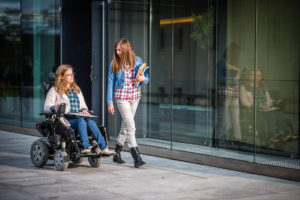Assisting Individuals With Special Needs
When putting together your parish safety and security plan, you must take into consideration those who may have physical limitations that may prevent them from acting quickly in a time of crisis. Work on establishing a system in advance to assure that these individuals will get the help they need, or will be best able to help themselves. Meet with the individuals and work with them to develop a plan. Bring first responders into the discussion, and document what to do in a variety of emergency situations.

In general, consider the following:
- Assess Emergency Routes. When doing your safety assessments, make sure there are emergency evacuation routes that are wheelchair accessible.
- Designate an Area of Refuge. Identify an area of refuge and/or designated stairwells where a wheelchair user can wait for assistance during an emergency. Mark these areas with signs, and make sure that your training includes mandating that individuals check these areas to offer assistance to those who need it.
- Use the Buddy System. Appoint individuals who will serve as “buddies” to those with special needs. The buddy will alert the individual of an emergency, check with them if the situation allows, and assist them as needed. However, sometimes a designated buddy is not there when the emergency occurs. For this reason, ALL staff need to know how to assist ahead of time; whoever is in the presence of a deaf person or a person with special needs automatically becomes their “buddy.”
- Consider Communication Methods. Plan for alternative methods of notifying those who are deaf and hard of hearing, such as turning lights on/off or waving arms. For those who are blind or have low vision, provide simple instructions to exit the building. Provide details about where you are going and any obstacles the person may encounter along the route. In most cases, the deaf are able to help themselves and have excellent intuition in regard to taking action. However, communication support is always critical.
- Ask Before Doing. Not every person with special needs will be identified ahead of time in your planning process. For example, you may have a wheelchair-bound person at Mass who is visiting the church for the first time. If an emergency occurs and you want to assist individuals you do not know, be sure to always ask how you can help before giving assistance. Ask how the individual can best be assisted or moved, and whether there are any special considerations or items that need to come with the person.
These are just a few suggestions to help you in your planning. Please contact your local department of health for more guidance.

